硬币饺子
包饺子里面放硬币作文

包饺子里面放硬币作文"英文回答,"One day, I was making dumplings with my family. As we were wrapping the dumplings, my sister suddenly suggested putting a coin inside one of the dumplings for good luck. At first, I thought it was a fun idea, but then I remembered the old saying, "A coin in the dumpling brings good fortune." So, I decided to go along with it and put a coin in one of the dumplings.Later, when we were eating the dumplings, my cousin bit into the one with the coin and was surprised to find it. We all laughed and joked about how lucky she must be now. It was a fun and memorable experience that brought us closer together as a family."中文回答,"有一天,我和家人一起包饺子。
当我们包饺子的时候,我妹妹突然建议在其中一个饺子里放一枚硬币以求好运。
起初,我觉得这是个有趣的主意,但后来我想起了那句古老的谚语,“饺子里藏着硬币,带来好运。
”所以,我决定跟着这个主意,在一个饺子里放了一枚硬币。
后来,当我们吃饺子的时候,我表妹咬到了那个里面有硬币的饺子,她惊讶地发现了硬币。
包饺子的传统习俗与技巧
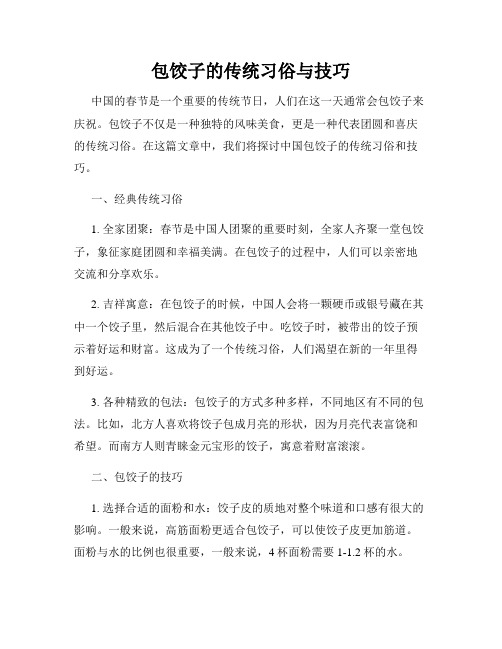
包饺子的传统习俗与技巧中国的春节是一个重要的传统节日,人们在这一天通常会包饺子来庆祝。
包饺子不仅是一种独特的风味美食,更是一种代表团圆和喜庆的传统习俗。
在这篇文章中,我们将探讨中国包饺子的传统习俗和技巧。
一、经典传统习俗1. 全家团聚:春节是中国人团聚的重要时刻,全家人齐聚一堂包饺子,象征家庭团圆和幸福美满。
在包饺子的过程中,人们可以亲密地交流和分享欢乐。
2. 吉祥寓意:在包饺子的时候,中国人会将一颗硬币或银号藏在其中一个饺子里,然后混合在其他饺子中。
吃饺子时,被带出的饺子预示着好运和财富。
这成为了一个传统习俗,人们渴望在新的一年里得到好运。
3. 各种精致的包法:包饺子的方式多种多样,不同地区有不同的包法。
比如,北方人喜欢将饺子包成月亮的形状,因为月亮代表富饶和希望。
而南方人则青睐金元宝形的饺子,寓意着财富滚滚。
二、包饺子的技巧1. 选择合适的面粉和水:饺子皮的质地对整个味道和口感有很大的影响。
一般来说,高筋面粉更适合包饺子,可以使饺子皮更加筋道。
面粉与水的比例也很重要,一般来说,4杯面粉需要1-1.2杯的水。
2. 抓揉合适的面团:在和面的过程中,需要适量地加水进面粉中,一边加水一边搅拌,直到面粉汇聚成团。
然后将面团倒在案板上,用手掌揉搓约10分钟,直到面团变得柔软有弹性。
3. 饺子皮的擀开:将面团分割成小块,用擀面杖将面团擀成薄饺子皮。
擀的过程中需要不停地撒上面粉,以防粘连。
饺子皮的大小取决于个人的喜好,但要记住,越薄的饺子皮越好吃。
4. 包饺子的方法:将馅料放在饺子皮中央,然后将饺子皮对折,封口处稍稍向内折叠。
接下来,利用双手的拇指和中指按住饺子皮两端,逐渐往中心方向压实。
最后,将两侧的饺子皮捏紧封口,确保馅料不会溢出。
5. 煮饺子的技巧:将饺子放入沸水中煮熟,烹调时间取决于饺子的大小。
在饺子浮起并沸腾后,再煮1-2分钟即可。
为了防止饺子粘连,可以在锅内加入少量的油,并经常搅拌。
三、传统和现代的变化虽然包饺子的传统习俗一直延续至今,但也随着时代的发展和人们的创新发生了一些变化。
过年包饺子放硬币的趣事作文

过年包饺子放硬币的趣事作文(3篇)篇1“爆竹声中一岁除,春风送暖入屠苏”在这可喜可贺的节日里,我们辞兔迎龙,真是一派新气象呀!过年的风俗有许多,其中,我最爱的就是包饺子。
俗话说:“春节包饺子,不吃掉耳朵。
”包饺子是个不简单的活儿,在包饺子前,准备工作是极重要的。
首先,是拌馅,把肉和韭菜切得碎碎的,再放些葱搅拌好。
其次是准备饺子皮,由于这些我都不熟,通常都是由大人完成的。
接下来,包饺子我可要大显身手了。
妈妈先给我示范了一下,只见她一手托着饺子皮,另一只手用勺子挖了一点馅,倒在皮上,然后食指点一下水,将皮的外围润一下。
之后把皮对折,捏中间,然后皮子两边向中间捏褶,像变魔术似的就包成了一个像元宝似的饺子。
妈妈的动作熟练至极,一气呵成,让我钦佩不已。
接下来,轮到我了。
我学着妈妈的样子,一手拿皮一手挖馅。
勺子看上去不大,但如果挖一大勺,皮就装不下。
点水捏皮,把皮子粘得牢牢的。
但是等我包好之后,一看这饺子,肚子鼓鼓的。
远远看过来,倒像是一个吃撑了的小娃娃,圆滚滚、胖乎乎的,极其可爱。
俗话说不能以貌取人,饺子太胖可不好。
不一会儿,饺子皮就胀开了,露出里面的馅。
妈妈鼓励道:“再试试,少点馅,肯定可以包好的。
”于是,我按照先前的步骤,重试一遍,不过少挖点馅,真的成功了!半个小时过去了,几十个俏皮可爱的饺子呈现在我们眼前,足够一家人吃了。
妈妈便端着饺子去了厨房,煮饺子去了。
不久,饺子出锅,一家人边看电视,边吃着热腾腾、香喷喷的饺子,能不快乐吗?这就是我们家乡的风俗——包饺子,饺子皮薄馅大,堪称舌尖上的美味,真是让人回味无穷啊!篇2盼着,盼着,春节到了,爆竹声响起来了……在春节,家家都吃饺子,我家也包饺子,去市场上买一沓饺子皮,准备肉,然后切成碎的,放胡萝卜和玉米然后和在一起,放到碗中备用。
再盛一小碗清水。
开始包饺子了,把饺子放在手掌里,用清水把周围一圈抹上水,用勺子勺一小勺肉在饺子皮上,接下来,最困难也最容易失误的环节来了——包饺子皮。
给别人送饺子的寓意
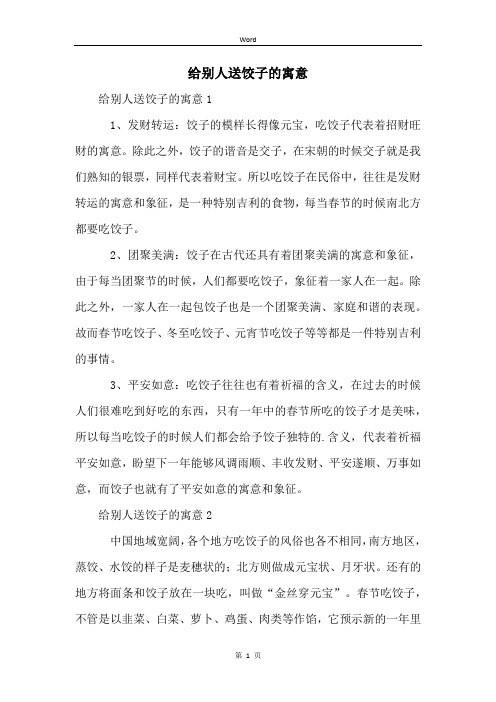
给别人送饺子的寓意给别人送饺子的寓意11、发财转运:饺子的模样长得像元宝,吃饺子代表着招财旺财的寓意。
除此之外,饺子的谐音是交子,在宋朝的时候交子就是我们熟知的银票,同样代表着财宝。
所以吃饺子在民俗中,往往是发财转运的寓意和象征,是一种特别吉利的食物,每当春节的时候南北方都要吃饺子。
2、团聚美满:饺子在古代还具有着团聚美满的寓意和象征,由于每当团聚节的时候,人们都要吃饺子,象征着一家人在一起。
除此之外,一家人在一起包饺子也是一个团聚美满、家庭和谐的表现。
故而春节吃饺子、冬至吃饺子、元宵节吃饺子等等都是一件特别吉利的事情。
3、平安如意:吃饺子往往也有着祈福的含义,在过去的时候人们很难吃到好吃的东西,只有一年中的春节所吃的饺子才是美味,所以每当吃饺子的时候人们都会给予饺子独特的.含义,代表着祈福平安如意,盼望下一年能够风调雨顺、丰收发财、平安遂顺、万事如意,而饺子也就有了平安如意的寓意和象征。
给别人送饺子的寓意2中国地域宽阔,各个地方吃饺子的风俗也各不相同,南方地区,蒸饺、水饺的样子是麦穗状的;北方则做成元宝状、月牙状。
还有的地方将面条和饺子放在一块吃,叫做“金丝穿元宝”。
春节吃饺子,不管是以韭菜、白菜、萝卜、鸡蛋、肉类等作馅,它预示新的一年里素静,安然无恙。
如今在中国,每逢过年,家家几乎都会做饺子。
饺子已成为中国文化的一部分。
过年时一家人聚在一起剁馅、和面、包饺子,热喧闹闹迎新年,则有着浓浓的意味,那就是团聚、喜庆、祝愿、平安。
民间认为,小年夜吃饺子,取意“送行饺子迎风面”。
上供时,饺子要端端正正摆上供台。
小年也是过年的开端,过年了自然也要吃饺子。
大年三十(除夕)吃饺子的意义更多。
饺子一般要在晚上12点以前包好,等到半夜子时吃,这时正是农历正月初一的开头,吃饺子取“更岁交子”之意。
事实上,不管不同的节气吃饺子代表何种寓意,可能都是中国人为“吃”找的理由。
过去,在物质匮乏的时代,逢年过节吃饺子,将肉、菜包在一起吃,是一种解馋的方法。
饺子的美好意义
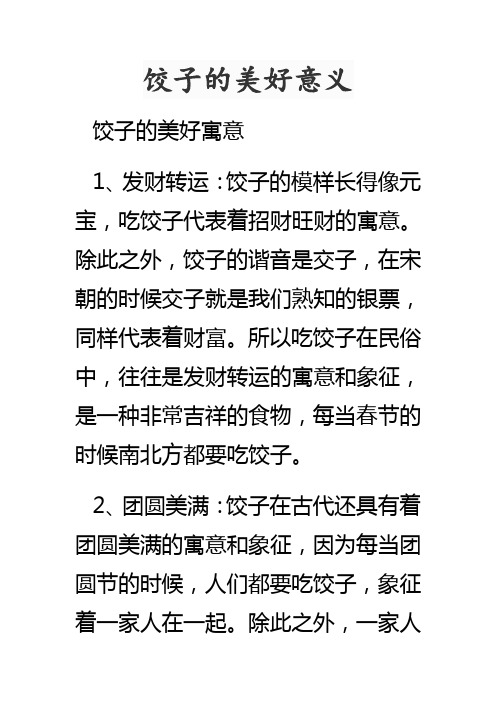
饺子的美好意义饺子的美好寓意1、发财转运:饺子的模样长得像元宝,吃饺子代表着招财旺财的寓意。
除此之外,饺子的谐音是交子,在宋朝的时候交子就是我们熟知的银票,同样代表着财富。
所以吃饺子在民俗中,往往是发财转运的寓意和象征,是一种非常吉祥的食物,每当春节的时候南北方都要吃饺子。
2、团圆美满:饺子在古代还具有着团圆美满的寓意和象征,因为每当团圆节的时候,人们都要吃饺子,象征着一家人在一起。
除此之外,一家人在一起包饺子也是一个团圆美满、家庭和谐的表现。
故而春节吃饺子、冬至吃饺子、元宵节吃饺子等等都是一件非常吉利的事情。
3、平安如意:吃饺子往往也有着祈福的含义,在过去的时候人们很难吃到好吃的东西,只有一年中的春节所吃的饺子才是美味,所以每当吃饺子的时候人们都会赋予饺子独特的含义,代表着祈福平安如意,希望下一年能够风调雨顺、丰收发财、平安遂顺、万事如意,而饺子也就有了平安如意的寓意和象征。
饺子的谐音寓意是什么意思1、过年吃饺子的寓意为“更岁交子”,“子”即为“午夜子。
时”,“交”和“饺”为谐音,有“喜庆吉祥”和“幸福团圆”的含义。
过年吃饺子,预示着吉祥如意、辞旧迎新。
2、包饺子寓意着喜庆吉祥、幸福美好。
过年包饺子时全家人一起动手,不同分工,齐心合力的幸福时刻。
包的是有滋有味的饺子,是将过去一年所有的不快琐事全都包走愿望,期盼的是新的一年的美好,体验的是全家和谐相处的幸福味道。
3、煮饺子寓意着奔腾向前、蒸蒸日上。
翻滚的水哗哗地开着,热腾腾的蒸汽扑面而来,一个个白胖胖的元宝娃娃在锅中上下翻腾,煮饺子的家人拿着勺子细心的、慢慢地将饺子在锅中搅拌,所有人都期盼着饺子快快出锅,元宝全部入库,喜事像开了花一样,也更期盼着自己的事业不断进取、永不止步。
4、吃饺子寓意着合家欢乐,团圆安康。
家家户户过年吃饺子时,全家人都会围坐桌前一同进餐,将幸福共同分享。
而且过年包的饺子也与众不同,饺子里会有各种各样的吉祥食品,像红糖、大枣、硬币等。
过年吃硬币饺子英语作文
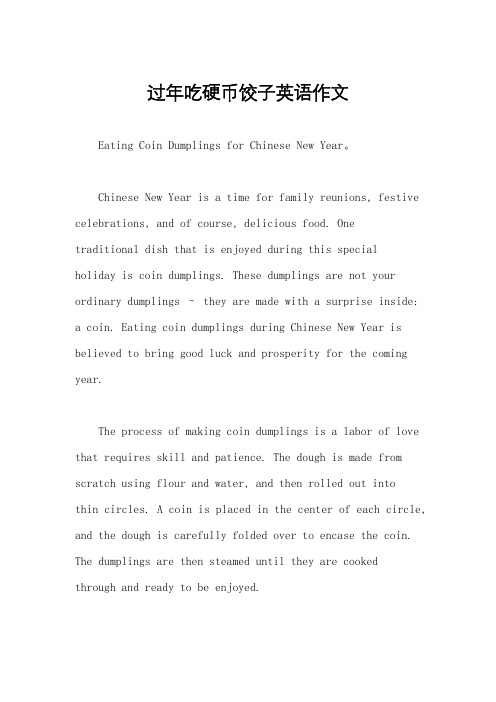
过年吃硬币饺子英语作文Eating Coin Dumplings for Chinese New Year。
Chinese New Year is a time for family reunions, festive celebrations, and of course, delicious food. Onetraditional dish that is enjoyed during this specialholiday is coin dumplings. These dumplings are not your ordinary dumplings – they are made with a surprise inside: a coin. Eating coin dumplings during Chinese New Year is believed to bring good luck and prosperity for the coming year.The process of making coin dumplings is a labor of love that requires skill and patience. The dough is made from scratch using flour and water, and then rolled out intothin circles. A coin is placed in the center of each circle, and the dough is carefully folded over to encase the coin. The dumplings are then steamed until they are cookedthrough and ready to be enjoyed.When the dumplings are served, each person at the table eagerly awaits their turn to bite into the dumpling and discover if they have found the lucky coin. Finding the coin is said to bring good fortune and wealth in the coming year. It is a fun and exciting tradition that adds an element of surprise to the meal.In addition to the symbolic meaning behind coin dumplings, they are also delicious to eat. The dough issoft and chewy, while the filling inside is savory and flavorful. The combination of textures and flavors makes coin dumplings a favorite dish for many during Chinese New Year.As the Lunar New Year approaches, families across China will be busy preparing for the festivities. Coin dumplings will be on the menu for many households, as they are a beloved tradition that brings joy and good luck to all who partake. Whether you find the lucky coin or not, eating coin dumplings is a delicious way to celebrate the new year with loved ones.In conclusion, coin dumplings are a special dish that is enjoyed during Chinese New Year. They are not only delicious to eat, but they also carry symbolic meaning and bring good luck to those who find the lucky coin. As families gather to celebrate the holiday, coin dumplings will be a popular choice for the dinner table. So why not try your hand at making coin dumplings this Chinese New Year and see if you can find the lucky coin? It's a fun and tasty tradition that is sure to bring joy and prosperity in the year ahead.。
写一篇饺子里的硬币的作文
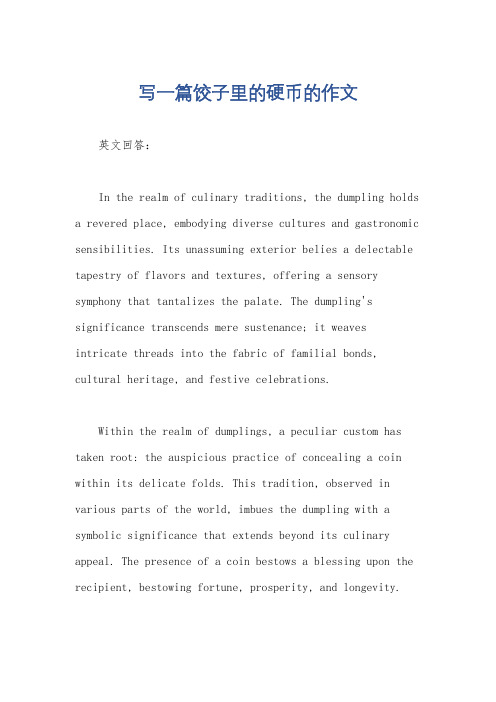
写一篇饺子里的硬币的作文英文回答:In the realm of culinary traditions, the dumpling holds a revered place, embodying diverse cultures and gastronomic sensibilities. Its unassuming exterior belies a delectable tapestry of flavors and textures, offering a sensory symphony that tantalizes the palate. The dumpling's significance transcends mere sustenance; it weavesintricate threads into the fabric of familial bonds, cultural heritage, and festive celebrations.Within the realm of dumplings, a peculiar custom has taken root: the auspicious practice of concealing a coin within its delicate folds. This tradition, observed in various parts of the world, imbues the dumpling with a symbolic significance that extends beyond its culinary appeal. The presence of a coin bestows a blessing upon the recipient, bestowing fortune, prosperity, and longevity.The practice of incorporating a coin into dumplings is believed to have originated in ancient China, where it was associated with the Lunar New Year celebrations. It is said that during the Han Dynasty, people would place a coin in a steamed bun as a symbol of wealth and good luck. Over time, this custom evolved, and the bun was replaced by the dumpling, which offered a more convenient and flavorful vessel for the precious coin.In many cultures, dumplings filled with coins are consumed during special occasions, such as weddings, birthdays, and holidays. The recipient of the coin-filled dumpling is considered to be the most fortunate, and they are often showered with well wishes and blessings. The tradition serves as a tangible reminder of the bonds that unite families and communities, transcending generations and uniting people in a shared experience of culinary delight.The symbolism associated with the coin-filled dumpling has also found expression in literature and folklore. In Chinese mythology, the dumpling is often depicted as asymbol of prosperity and abundance. It is believed that the person who eats the coin-filled dumpling will be rewarded with wealth and success throughout the year.The practice of including a coin in dumplings has also spread to other parts of the world, including Korea, Japan, and Southeast Asia. In Korea, dumplings filled with coins are known as "tteokjip," and they are traditionally consumed during the Lunar New Year. In Japan, a similar custom exists, where dumplings called "gyoza" are sometimes filled with coins during special occasions.In many cultures, the coin concealed within the dumpling is not merely a token of fortune but also a representation of the hopes and aspirations of those who eat it. It serves as a reminder to strive for prosperity, to live a long and fulfilling life, and to cherish the bonds that unite us. The dumpling, with its rich symbolic meaning and delectable flavors, has become an enduring testament to the human spirit and the power of culinary traditions to shape our lives.中文回答:饺子,一种在世界各地备受推崇的美食,体现了不同的文化和烹饪理念。
写一篇饺子里的硬币的作文

写一篇饺子里的硬币的作文英文回答:In the depths of a small village, there was a family known for their exquisite dumplings. Every year, during the Spring Festival, they would gather together to make these delicious treats. It was a tradition that had been passed down from generation to generation.One year, as they were making the dumplings, they discovered something unusual. Inside one of the dumplings, they found a coin. It was a shiny, silver coin that seemed out of place. They were puzzled as to how it ended up inside the dumpling.Curiosity got the better of them, and they decided to investigate further. They carefully examined each dumpling, and to their surprise, they found more coins. It seemedthat every dumpling they made had a hidden coin inside.They couldn't help but wonder why someone would hide coins inside the dumplings. Was it a prank? Or was there a deeper meaning behind it? They pondered over this mystery as they continued to make the dumplings.As they shared their discovery with the villagers, the news spread like wildfire. Everyone in the village wanted to taste these special dumplings with hidden coins. People from neighboring villages also heard about it and came to try their luck.The family became famous overnight, and their dumplings became a symbol of good luck and fortune. People believed that whoever found a coin in their dumpling would have a prosperous year ahead. It became a tradition for families to gather and make dumplings during the Spring Festival, hoping to find a coin in their dumplings.The tradition continued for years, and the village thrived because of it. The family's dumplings became renowned all over the country, and people traveled from far and wide to taste their special dumplings.中文回答:在一个小村庄的深处,有一个以制作精美饺子而闻名的家族。
包饺子加硬币的作文
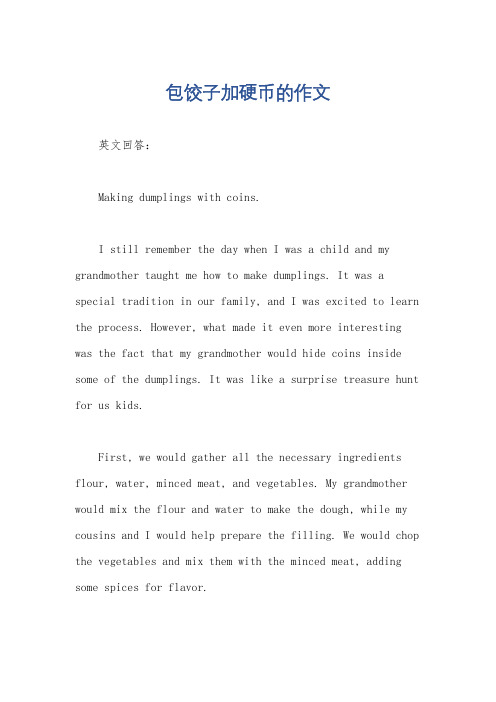
包饺子加硬币的作文英文回答:Making dumplings with coins.I still remember the day when I was a child and my grandmother taught me how to make dumplings. It was a special tradition in our family, and I was excited to learn the process. However, what made it even more interesting was the fact that my grandmother would hide coins inside some of the dumplings. It was like a surprise treasure hunt for us kids.First, we would gather all the necessary ingredients flour, water, minced meat, and vegetables. My grandmother would mix the flour and water to make the dough, while my cousins and I would help prepare the filling. We would chop the vegetables and mix them with the minced meat, adding some spices for flavor.Once the dough was ready, my grandmother would divideit into small portions and roll them out into thin circles. This was the most challenging part for me at first, as I struggled to make the circles perfectly round. But with practice, I gradually improved.Next, we would place a spoonful of the filling in the center of each circle and fold it in half, sealing the edges with our fingers. This was the moment when my grandmother would secretly slip a coin into some of the dumplings. It was always a mystery as to which ones contained the hidden treasure.After all the dumplings were made, we would boil them in a large pot of water. As they cooked, the aroma filled the kitchen, making our mouths water in anticipation. Once they were done, we would eagerly gather around the table, ready to enjoy our delicious homemade dumplings.As we ate, we would take turns biting into the dumplings, hoping to be the lucky one to find a coin. It was like a game of chance, and the excitement grew witheach bite. The one who found a coin would be consideredlucky and would receive a special prize from my grandmother.中文回答:包饺子加硬币。
春节包饺子放硬币作文
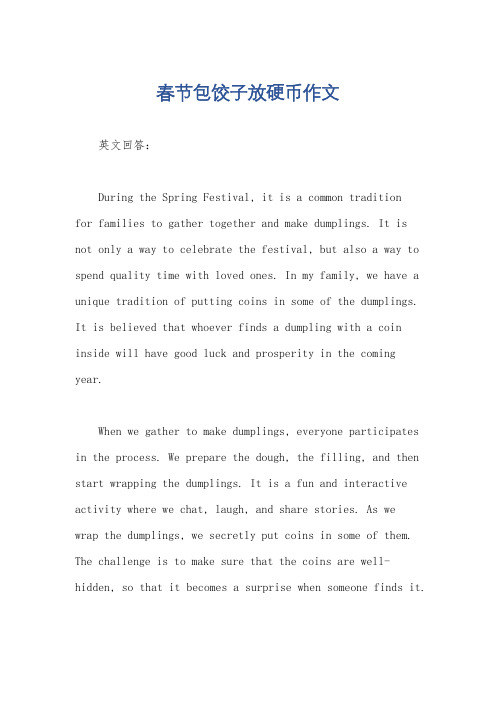
春节包饺子放硬币作文英文回答:During the Spring Festival, it is a common traditionfor families to gather together and make dumplings. It isnot only a way to celebrate the festival, but also a way to spend quality time with loved ones. In my family, we have a unique tradition of putting coins in some of the dumplings. It is believed that whoever finds a dumpling with a coin inside will have good luck and prosperity in the coming year.When we gather to make dumplings, everyone participates in the process. We prepare the dough, the filling, and then start wrapping the dumplings. It is a fun and interactive activity where we chat, laugh, and share stories. As wewrap the dumplings, we secretly put coins in some of them. The challenge is to make sure that the coins are well-hidden, so that it becomes a surprise when someone finds it.Once the dumplings are cooked, we gather around thetable to enjoy the delicious meal. As we eat, we also keep an eye out for the lucky dumplings. It is an exciting moment when someone bites into a dumpling and discovers a coin. The lucky person is congratulated and we all cheerfor their good fortune. It adds an element of excitementand anticipation to the meal.中文回答:春节期间,家庭聚在一起包饺子是一个常见的传统。
过年包饺子硬币作文
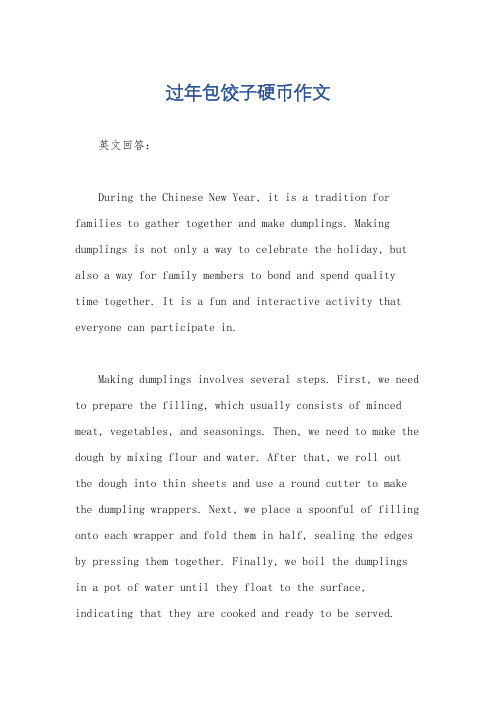
过年包饺子硬币作文英文回答:During the Chinese New Year, it is a tradition for families to gather together and make dumplings. Making dumplings is not only a way to celebrate the holiday, but also a way for family members to bond and spend quality time together. It is a fun and interactive activity that everyone can participate in.Making dumplings involves several steps. First, we need to prepare the filling, which usually consists of minced meat, vegetables, and seasonings. Then, we need to make the dough by mixing flour and water. After that, we roll out the dough into thin sheets and use a round cutter to make the dumpling wrappers. Next, we place a spoonful of filling onto each wrapper and fold them in half, sealing the edges by pressing them together. Finally, we boil the dumplings in a pot of water until they float to the surface, indicating that they are cooked and ready to be served.There are many reasons why making dumplings is such a popular activity during the Chinese New Year. Firstly, itis believed that eating dumplings brings good luck and prosperity for the coming year. The shape of the dumplings resembles ancient Chinese silver ingots, symbolizing wealth and fortune. Additionally, the act of making dumplings together as a family promotes unity and harmony within the household. It is a time for family members to share stories, laughter, and love while working together towards a common goal.中文回答:过年包饺子是中国的传统习俗之一。
吃到硬币饺子的文案
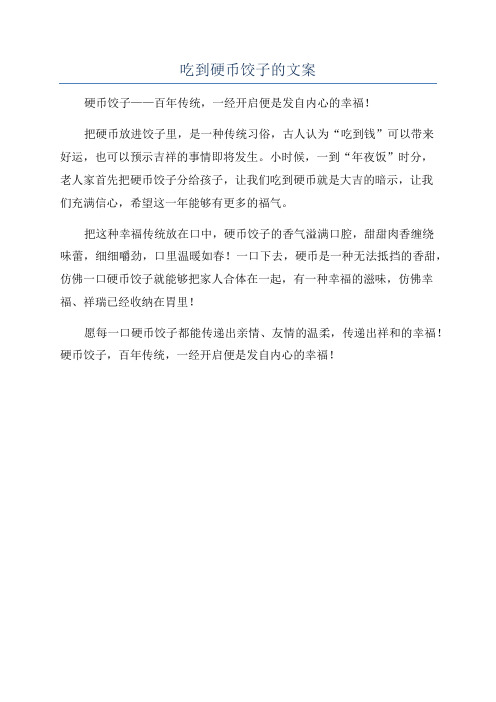
吃到硬币饺子的文案
硬币饺子——百年传统,一经开启便是发自内心的幸福!
把硬币放进饺子里,是一种传统习俗,古人认为“吃到钱”可以带来
好运,也可以预示吉祥的事情即将发生。
小时候,一到“年夜饭”时分,
老人家首先把硬币饺子分给孩子,让我们吃到硬币就是大吉的暗示,让我
们充满信心,希望这一年能够有更多的福气。
把这种幸福传统放在口中,硬币饺子的香气溢满口腔,甜甜肉香缠绕
味蕾,细细嚼劲,口里温暖如春!一口下去,硬币是一种无法抵挡的香甜,仿佛一口硬币饺子就能够把家人合体在一起,有一种幸福的滋味,仿佛幸福、祥瑞已经收纳在胃里!
愿每一口硬币饺子都能传递出亲情、友情的温柔,传递出祥和的幸福!硬币饺子,百年传统,一经开启便是发自内心的幸福!。
过年吃硬币饺子英语作文

过年吃硬币饺子英语作文英文回答:Chinese New Year is a time for family, friends, and food. But what if you could combine all three in one delicious tradition? That's where the tradition of eating a hard coin inside a jiaozi (dumpling) comes in.Here is how it works: Before the New Year, the family gathers together and prepares a batch of jiaozi. Inside one of the dumplings, they place a hard coin. On New Year's Day, the family sits down to eat their jiaozi. The person who gets the dumpling with the coin is said to be blessed with good luck for the coming year.The tradition of eating a hard coin inside a jiaozi is believed to have originated in the Han Dynasty. At that time, coins were made of copper, which was thought to have magical properties. People believed that by eating a coin, they would absorb its good luck and prosperity.Today, the tradition of eating a hard coin in a jiaoziis still popular in many parts of China. It is a fun and festive way to celebrate the New Year and to wish eachother good luck.中文回答:春节是家人、朋友和美食团圆的日子。
饺子里放硬币的风俗作文
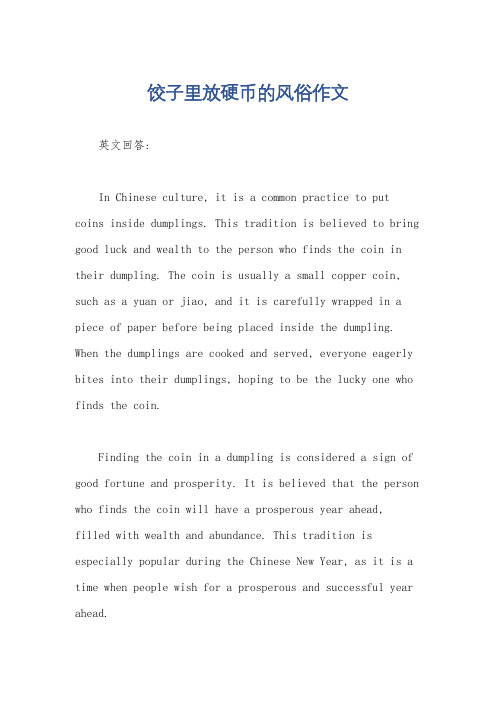
饺子里放硬币的风俗作文英文回答:In Chinese culture, it is a common practice to put coins inside dumplings. This tradition is believed to bring good luck and wealth to the person who finds the coin in their dumpling. The coin is usually a small copper coin, such as a yuan or jiao, and it is carefully wrapped in a piece of paper before being placed inside the dumpling. When the dumplings are cooked and served, everyone eagerly bites into their dumplings, hoping to be the lucky one who finds the coin.Finding the coin in a dumpling is considered a sign of good fortune and prosperity. It is believed that the person who finds the coin will have a prosperous year ahead,filled with wealth and abundance. This tradition is especially popular during the Chinese New Year, as it is a time when people wish for a prosperous and successful year ahead.The act of putting coins inside dumplings also has a symbolic meaning. Dumplings are a traditional Chinese food that is often eaten during celebrations and festivals. They are shaped like gold ingots, which were used as currency in ancient China. By putting a coin inside a dumpling, it is believed to symbolize the wish for wealth and prosperity.Aside from the symbolic meaning, the tradition ofputting coins inside dumplings also adds an element of surprise and excitement to the meal. It creates a sense of anticipation as everyone eagerly bites into their dumplings, hoping to be the lucky one who finds the coin. It also adds a fun and playful element to the meal, as people compete to see who will find the coin first.This tradition is not only limited to Chinese culture. Similar customs can be found in other Asian countries, such as Japan and Korea. In Japan, for example, it is common to put a small coin inside a traditional New Year's dishcalled ozoni. This dish is similar to dumplings and is believed to bring good luck and fortune to the person whofinds the coin.In conclusion, the tradition of putting coins inside dumplings is a common practice in Chinese culture. It is believed to bring good luck and wealth to the person who finds the coin. This tradition adds an element of surprise and excitement to the meal, and it also has a symbolic meaning of wishing for prosperity and abundance. It is a tradition that is cherished and enjoyed by many, especially during festive occasions like the Chinese New Year.中文回答:在中国文化中,把硬币放在饺子里是一种常见的习俗。
在饺子里放硬币作文

在饺子里放硬币作文In many cultures, putting a coin in a dumpling is believed to bring good luck and prosperity. It is a tradition that has been passed down through generations and is often practiced during special occasions such as Lunar New Year celebrations or weddings. The act of finding the coin in a dumpling is considered auspicious and is believed to bring wealth and fortune to the person who discovers it.在许多文化中,把硬币放在饺子里被认为能够带来好运和繁荣。
这是一种代代相传的传统,通常在特殊场合如农历新年庆祝活动或婚礼中实践。
在饺子里找到硬币的行为被认为是吉祥的,据信会给发现它的人带来财富和幸运。
However, there are also potential risks associated with putting a coin in a dumpling. If not done properly, there is a chance that the coin could be accidentally swallowed, leading to choking or other health hazards. This has raised concerns among health experts who caution against the practice of putting coins in food due to the potential dangers it poses.然而,把硬币放在饺子里也存在一些潜在的风险。
家乡习俗饺子里面包硬币的作文六年级
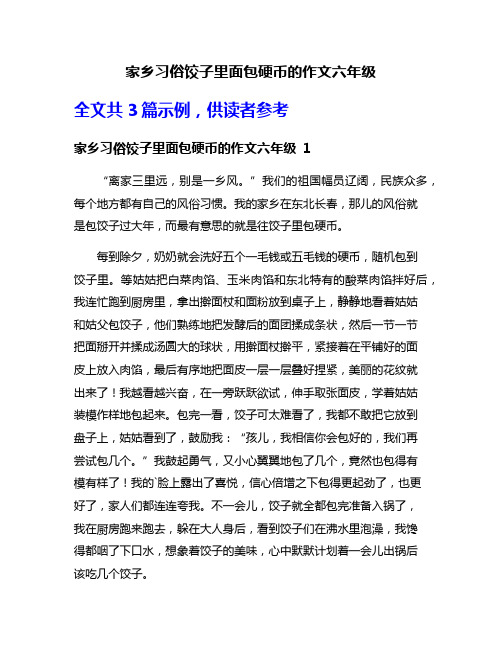
家乡习俗饺子里面包硬币的作文六年级全文共3篇示例,供读者参考家乡习俗饺子里面包硬币的作文六年级1“离家三里远,别是一乡风。
”我们的祖国幅员辽阔,民族众多,每个地方都有自己的风俗习惯。
我的家乡在东北长春,那儿的风俗就是包饺子过大年,而最有意思的就是往饺子里包硬币。
每到除夕,奶奶就会洗好五个一毛钱或五毛钱的硬币,随机包到饺子里。
等姑姑把白菜肉馅、玉米肉馅和东北特有的酸菜肉馅拌好后,我连忙跑到厨房里,拿出擀面杖和面粉放到桌子上,静静地看着姑姑和姑父包饺子,他们熟练地把发酵后的面团揉成条状,然后一节一节把面掰开并揉成汤圆大的球状,用擀面杖擀平,紧接着在平铺好的面皮上放入肉馅,最后有序地把面皮一层一层叠好捏紧,美丽的花纹就出来了!我越看越兴奋,在一旁跃跃欲试,伸手取张面皮,学着姑姑装模作样地包起来。
包完一看,饺子可太难看了,我都不敢把它放到盘子上,姑姑看到了,鼓励我:“孩儿,我相信你会包好的,我们再尝试包几个。
”我鼓起勇气,又小心翼翼地包了几个,竟然也包得有模有样了!我的`脸上露出了喜悦,信心倍增之下包得更起劲了,也更好了,家人们都连连夸我。
不一会儿,饺子就全都包完准备入锅了,我在厨房跑来跑去,躲在大人身后,看到饺子们在沸水里泡澡,我馋得都咽了下口水,想象着饺子的美味,心中默默计划着一会儿出锅后该吃几个饺子。
不一会儿,饺子出锅被端上了桌,那香味随着热气蒸腾散发,令人不禁垂涎三尺,家人们围坐在一起,很快就风卷残云般吃光了盘子里的饺子。
我也心满意足地摸着肚子,好奇地问爸爸:“春节吃饺子寓意着什么?”爸爸想了一下,和蔼地对我说:“饺子和‘交子’是谐音,而交子代表新旧年之间交替的时候,所以吃饺子代表新的一年吉祥如意。
除夕包饺子既能品尝到美味的食物,也能让家人们欢聚一堂,在欢乐祥和的气氛中,迎接新一年的到来!”春节包饺子原来是这么有意义的风俗!在我的家乡,还有很多其他独特的东北风俗,如果你感兴趣也可以查一查。
家乡习俗饺子里面包硬币的作文六年级2家乡的风俗有很多,二月二龙抬头,正月十五送灯,除夕夜吃年夜饭,包饺子……我最喜欢的是在除夕夜那天包饺子吃饺子。
饺子包硬币 作文
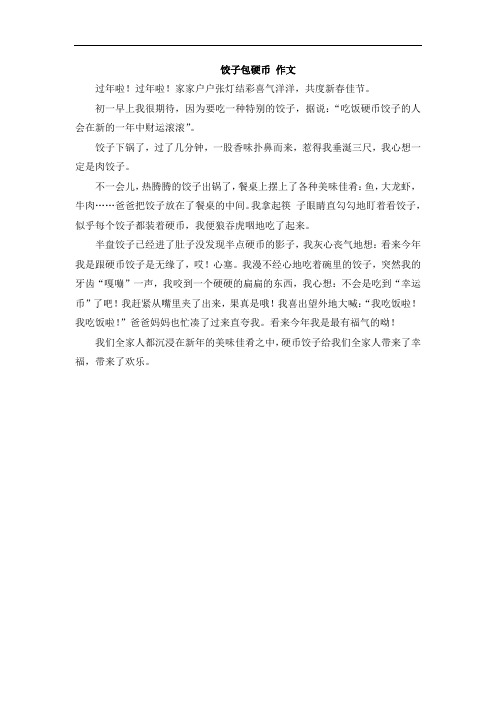
饺子包硬币作文
过年啦!过年啦!家家户户张灯结彩喜气洋洋,共度新春佳节。
初一早上我很期待,因为要吃一种特别的饺子,据说:“吃饭硬币饺子的人会在新的一年中财运滚滚”。
饺子下锅了,过了几分钟,一股香味扑鼻而来,惹得我垂涎三尺,我心想一定是肉饺子。
不一会儿,热腾腾的饺子出锅了,餐桌上摆上了各种美味佳肴:鱼,大龙虾,牛肉……爸爸把饺子放在了餐桌的中间。
我拿起筷子眼睛直勾勾地盯着看饺子,似乎每个饺子都装着硬币,我便狼吞虎咽地吃了起来。
半盘饺子已经进了肚子没发现半点硬币的影子,我灰心丧气地想:看来今年我是跟硬币饺子是无缘了,哎!心塞。
我漫不经心地吃着碗里的饺子,突然我的牙齿“嘎嘣”一声,我咬到一个硬硬的扁扁的东西,我心想:不会是吃到“幸运币”了吧!我赶紧从嘴里夹了出来,果真是哦!我喜出望外地大喊:“我吃饭啦!我吃饭啦!”爸爸妈妈也忙凑了过来直夸我。
看来今年我是最有福气的呦!
我们全家人都沉浸在新年的美味佳肴之中,硬币饺子给我们全家人带来了幸福,带来了欢乐。
包饺子里面放硬币作文

包饺子里面放硬币作文英文回答:When I was making dumplings one day, I decided to add a surprise element to them. Instead of just filling them with the usual meat and vegetables, I decided to put some coins inside. I thought it would be a fun way to bring some excitement to the meal. Little did I know that this decision would lead to an unexpected turn of events.As I started making the dumplings, I carefully placed a coin in each one. I made sure to seal them properly so that the coins wouldn't fall out during the cooking process. Once they were all ready, I boiled them in a pot of water, eagerly waiting for the surprise to unfold.When the dumplings were cooked, I served them to my family and friends. As they bit into the dumplings, their faces lit up with surprise and excitement. It was like a mini treasure hunt, with everyone hoping to find a coin intheir dumpling. Some were lucky and found a coin, while others weren't as fortunate. But regardless of the outcome, it brought laughter and joy to the table.However, as the meal progressed, I noticed that one of my friends seemed to be in discomfort. He was chewing on something hard and couldn't seem to swallow it. Concerned, I asked him what was wrong. He pointed to his mouth and said that he had accidentally bitten into a coin that was hidden in the dumpling. I immediately felt guilty and apologized profusely. Thankfully, he was able to remove the coin from his mouth without any harm done.This incident made me realize the importance of being cautious when adding surprises to food. While it can be fun and exciting, it's crucial to consider the safety of those who will be consuming it. I learned my lesson and promised myself to be more careful in the future.中文回答:有一天,我在包饺子的时候,决定给饺子增加一些惊喜。
饺子:中华民间传说与神话故事

饺子:中华民间传说与神话故事饺子作为中国传统美食之一,在中国人的餐桌上历史悠久且备受喜爱。
除了其美味可口的口感,饺子也有着丰富的文化内涵和神话传说。
让我们一起来探索饺子背后隐藏的中华民间传说与神话故事。
一、饺子的起源古代中国有一位名叫张仲景的医药学家,他在东汉末年创制了一种药物,这种药物可以预防感冒并增强人体免疫力。
然而,这种药物十分苦涩,人们用饺子的独特形状包裹了这种药物,希望通过食用饺子来吃下这种药物。
在春节这一天,人们都会聚在一起包饺子,并将其中一颗饺子内放入药物,以祈求健康和平安。
二、小年夜的饺子民间传说,在农历十二月的小年夜,也就是除夕的前一天晚上,厨房里的灶神会返回人间检查家庭的大小事务。
为了表示对灶神的敬意,人们会事先准备好包裹着各种馅料的饺子,在灶台上煮熟。
据说,灶神对饺子情有独钟,并会在家庭祭拜仪式结束后享用这些美味的饺子。
人们相信,通过供奉饺子给灶神,可以确保一家人在新的一年里平平安安、和睦幸福。
三、神话传说中的饺子在中国神话传说中,也有与饺子相关的故事。
一个最著名的故事是涉及到了一个名叫伏羲的神仙。
伏羲是中华民族的始祖,传说他给人类带来了很多礼物和技艺。
有一天,他发现人类在寒冷的冬天里冻得瑟瑟发抖。
为了帮助人们度过难关,他教人们把各种食材包进一种半月形的面片内,蒸煮而食,这就是我们今天所称之为饺子的美食。
四、饺子与祈福在中国的传统节日中,饺子也经常被用来祈福和表达美好的愿望。
在农历新年的除夕夜,家人们聚集在一起包饺子,每个家庭会将其中一颗饺子藏有硬币,而最幸运的人将会吃到那颗有硬币的饺子。
传说中,吃到有硬币的饺子的人将会在未来的一年里获得好运和财富。
五、不同地区的饺子传说与习俗中国的地域广阔,各个地区都有独特的饺子传说与习俗。
例如,在北方的冬至节,人们会吃一种叫做“冬至饺子”的特别饺子。
据说,冬至那天吃了这种饺子,可以驱寒保暖,并让来年的作物丰收。
六、饺子的民间传说与寓意除了以上的传说和故事,饺子在中国的民间传说中还寓意着团圆和幸福。
饺子包硬币的作文
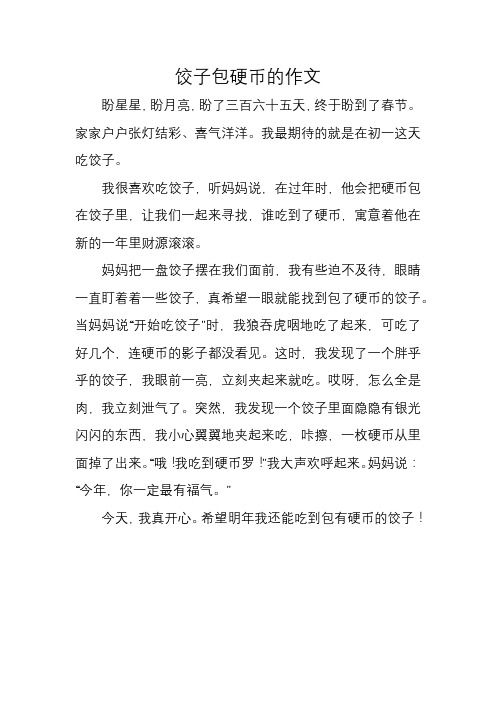
饺子包硬币的作文
盼星星,盼月亮,盼了三百六十五天,终于盼到了春节。
家家户户张灯结彩、喜气洋洋。
我最期待的就是在初一这天吃饺子。
我很喜欢吃饺子,听妈妈说,在过年时,他会把硬币包在饺子里,让我们一起来寻找,谁吃到了硬币,寓意着他在新的一年里财源滚滚。
妈妈把一盘饺子摆在我们面前,我有些迫不及待,眼睛一直盯着着一些饺子,真希望一眼就能找到包了硬币的饺子。
当妈妈说“开始吃饺子”时,我狼吞虎咽地吃了起来,可吃了好几个,连硬币的影子都没看见。
这时,我发现了一个胖乎乎的饺子,我眼前一亮,立刻夹起来就吃。
哎呀,怎么全是肉,我立刻泄气了。
突然,我发现一个饺子里面隐隐有银光闪闪的东西,我小心翼翼地夹起来吃,咔擦,一枚硬币从里面掉了出来。
“哦!我吃到硬币罗!”我大声欢呼起来。
妈妈说:“今年,你一定最有福气。
”
今天,我真开心。
希望明年我还能吃到包有硬币的饺子!。
